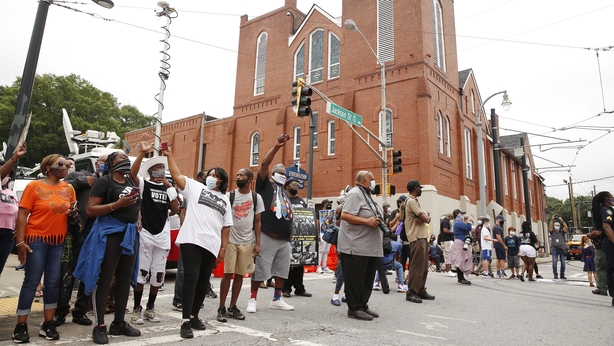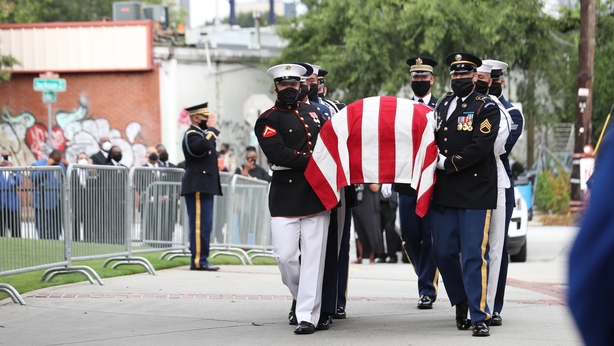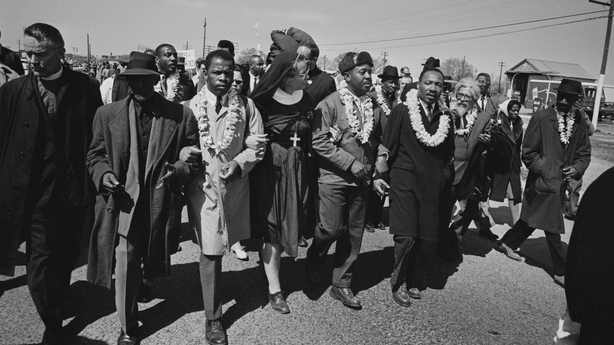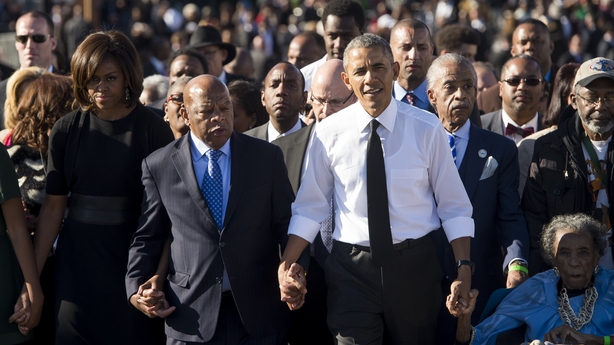Former US president Barack Obama has condemned the use of federal agents against protesters and attempts at voter suppression.
"Today we witness with our own eyes, police officers kneeling on the necks of black Americans," Mr Obama said in a eulogy at the funeral service in Georgia of civil rights leader John Lewis.
"We can witness our federal government sending agents to use tear gas and batons against peaceful demonstrators," he said.
Mr Obama did not mention Mr Trump by name but he was clearly referencing recent moves by the president, who used troops to clear protesters from Lafayette Square outside the White House and sent federal agents recently to Portland, Oregon.

Mr Obama also criticised Republican attempts to suppress the minority vote and President Trump's repeated attacks on postal voting.
"Even as we sit here, there are those in power who are doing their darnedest to discourage people from voting by closing polling locations and targeting minorities and students with restrictive ID laws and attacking our voting rights with surgical precision, even undermining the postal service in the run-up to an election that's going to be dependent on mail-in ballots so people don't get sick," he said.
President Trump launched another attack on postal voting today and suggested that November's presidential election be delayed.
Postal voting is expected to play a more prominent role in the poll because of the coronavirus outbreak.

Paying tribute to Mr Lewis, who died on 17 July at the age of 80 after a battle with pancreatic cancer, Mr Obama said the former Democratic congressman did "everything he could to preserve this democracy and as long as we have breath in our bodies, we have to continue his cause".
He was also praised at the service by two other former US presidents - George W Bush and Bill Clinton.
They both spoke of Mr Lewis' humble beginnings on a farm in Troy, Alabama, to becoming a leader of the civil rights movement and ultimately the man known as the "conscience of Congress".
More than 1,000 people gathered outside Ebenezer Baptist Church in Atlanta to pay their last respects.
Reverend Martin Luther King Junior - a mentor to Mr Lewis in the civil rights struggle - once preached at the church. He was assassinated in 1968.
"We live in a better and nobler country today because of John Lewis," said Mr Bush, who remembered joining Mr Lewis in Selma, Alabama, for the 50th anniversary of the watershed march across the Edmund Pettus Bridge. "The story that began in Troy isn't ending here today, nor is the work."

Mr Lewis, an Alabama farmer's son who strove for equality for Black people in an America grappling with racial bigotry and segregation, was a champion of non-violent protest and was inspired by Mr King.
John Lewis was first elected in 1986 to represent Georgia in the US House of Representatives.
His death came at a time of reckoning across the United States over racial injustice, with widespread protests condemning unequal police treatment of Black Americans and institutions removing or renaming tributes to former leaders of the pro-slavery Confederacy.
The funeral followed a week of memorial services.

The coffin bearing his body was escorted across the Edmund Pettus Bridge on Sunday, decades after his beating there drew a national spotlight to the struggle for racial equality.
On Monday his casket was taken to the US Capitol in Washington where it lay in state through Tuesday.
In an essay written shortly before his death and published in the New York Times today, Mr Lewis called on the US to come together for justice and equality.
"When historians pick up their pens to write the story of the 21st century, let them say that it was your generation who laid down the heavy burdens of hate at last and that peace finally triumphed over violence, aggression and war," he wrote.
"So I say to you, walk with the wind, brothers and sisters, and let the spirit of peace and the power of everlasting love be your guide."

